Transferencias monetarias multipropósito
Las TMM son transferencias de efectivo sin restricción que las personas afectadas por una crisis pueden utilizar para cubrir sus necesidades básicas. Por su naturaleza, las TMM son la modalidad de asistencia que ofrece a las personas un máximo grado de elección, flexibilidad y dignidad. También existen cada vez más evidencias de que son más costo-eficientes y costo-efectivas para satisfacer múltiples necesidades.
No obstante, las TMM requieren nuevas formas de colaboración entre los actores humanitarios, en todas las etapas del ciclo del programa, así como entre sectores. Si bien existen herramientas sólidas para fomentar la colaboración, éstas no han sido ampliamente adoptadas y las TMM todavía son utilizadas de manera ad hoc. Quedan desafíos por abordar si queremos integrar las TMM en el sistema humanitario con éxito.
Iniciativas relacionadas
Contenido destacado
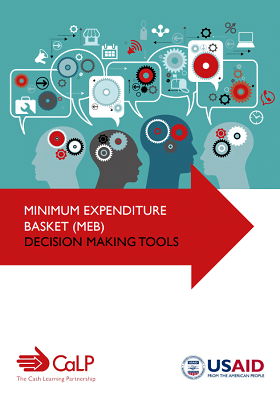
Minimum Expenditure Basket (MEB) Decision Making Tools
Guidelines and Tools
Update: This publication was revised in 2022. Please read the revised publication here.
The purpose of this tipsheet is to accompany practitioners and decision makers through key stages in the process of calculating an MEB to: (a)
identify what is the most appropriate path to take in relation to their
particular context, identified objective, existing capacities and available
resources; and...
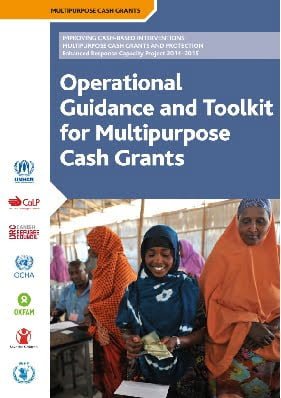
Operational Guidance and Toolkit for Multipurpose Cash Grants
Guidelines and Tools
This operational guidance and toolkit brings together worldwide expertise on cash-based interventions (CBIs). It provides comprehensive and practical guidance for humanitarian actors to assess the feasibility, conceptualise the design and structure the implementation of MPGs. The guidance focuses on MPGs whose primary objective is to meet basic needs as defined by affected people...

Definition of Minimum Expenditure Baskets (MEB) in West Africa
Report
Throughout 2017, five countries in West Africa have worked collectively to define minimum expenditure baskets, in order to better capture the contribution that humanitarian assistance is making to address the basic needs of affected populations, and improve the impact of assistance. This heavy process raises technical and coordination challenges. The CALP Network, with support from USAID /...
Últimos recursos
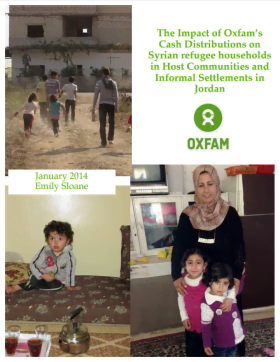
The Impact of Oxfam’s Cash Distributions on Syrian Refugee Households in Host Communities and Informal Settlements in Jordan
Report
Given the absence of viable alternatives to cash transfer programmes (CTPs) in Jordan, such programmes will certainly continue for the foreseeable future. It is crucial to review their impact to date in order to identify common issues and lessons learned and adjust programmes accordingly. The present...

Is Cash Transfer Programming ‘Fit for the Future’? – Final Report
Report
This report presents the results of a 2013 research study entitled, Is Cash Transfer Programming ‘Fit for the Future’? The research was commissioned by the the CALP Network and undertaken by the Humanitarian Futures Programme (HFP), King’s College London. The project intends to understand...

Effects of the Palestinian National Cash Transfer Programme on Children and Adolescents
Report
Over the past two decades, social protection programmes have been implemented in many developing countries to reduce poverty and vulnerabilities in the face of context-specific challenges such as economic crises,inequality and exclusion, and human development deficits. The multidimensional...
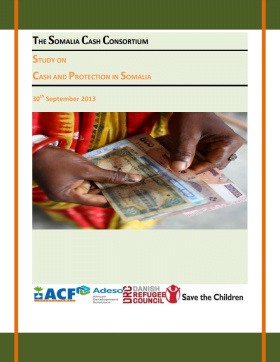
Study on Cash and Protection in Somalia
Report
The worst drought to hit Somalia in 60 years happened in 2011 and came to be popularly known as ‘The Horn of Africa Hunger Crisis’. The drought happened in a context of active conflict and a weak government that could neither protect its citizens nor the humanitarian actors. The Somalia Cash...
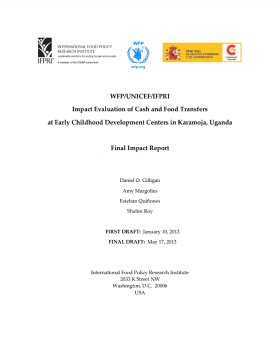
Impact Evaluation of Cash and Food Transfers at Early Childhood Development Centers in Karamoja, Uganda
Report
This report is a revised draft of the Final Impact Report of an impact evaluation study of the World Food Programme (WFP) project to provide food and cash transfers to households with children participating in Early Childhood Development (ECD) centers in the Karamoja sub region of Uganda. The analysis...
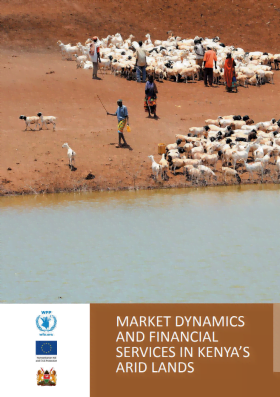
Markets dynamics and financial services in Kenya’s Arid and Semi-Arid Lands
Guidelines and Tools
The Vulnerability Analysis and Mapping (VAM) team of WFP recently finalised a market study on the Arid and Semi-Arid Lands (ASALs) of Kenya. The study explores market dynamics and financial service access for pastoral communities. This executive summary shortly presents the findings of this study. The...

Impact Evaluation of Cash and Food Transfers for the Seasonal Emergency Safety Net in Hajjah and Ibb Governorates, Yemen Endline Report
Report
This report is the final impact evaluation of the World Food Programme’s Cash and Food transfer program in Yemen. The program operated in Hajjah and Ibb governorates within the larger Emergency Safety Net (ESN), which provides assistance to qualifying households in rural Yemen. The report details the...

Cash Preparedness in Senegal: Cash Transfer Mechanisms
Report
Recognizing the growing importance of cash-based responses in humanitarian interventions and building on its own experience of implementing cash transfer programs through local partner organizations in Senegal in 2010 and 2012, Oxfam America sought to hire a consultant to determine the most feasible...
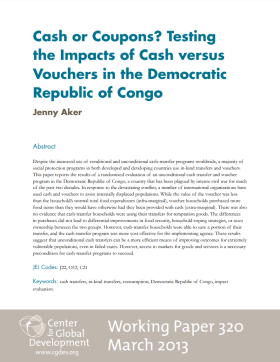
Cash or Coupons? Testing the impacts of cash transfers versus vouchers in the Democratic Republic of Congo
Report
Despite the increased use of conditional and unconditional cash-transfer programs worldwide, a majority of social protection programs in both developed and developing countries use in-kind transfers and vouchers. This paper reports the results of a randomized evaluation of an unconditional cash transfer...

An Innovative way of Humanitarian Assistance using Mobile Money Transfer in Bangladesh
Presentation
A video detailing Oxfam’s use of mobile money transfer in Bangladesh.

Social Acceptability and Perceived Impact of a Community-Led Cash Transfer Programme in Zimbabwe
Report
Cash transfer programmes are increasingly recognised as promising and scalable interventions that can promote the health and development of children in poor resource and high HIV prevalence areas of sub-Saharan Africa. However, concerns have been raised about the potential for cash transfer programmes to...

Logistics and Administration Guideline for Cash Based Interventions
Guidelines and Tools
Cash-based interventions (CBIs) are increasingly included in humanitarian relief efforts as alternatives or complements to in-kind assistance. This guideline is mainly dedicated to logisticians and administrators to successfully support CBIs but also to technical departments. The objectives of this...
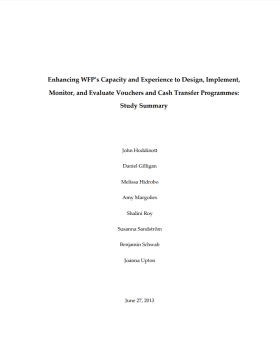
Enhancing WFP’s Capacity and Experience to Design, Implement, Monitor, and Evaluate Vouchers and Cash Transfer Programmes: Study summary
Report
With support from the Government of Spain, and in partnership with the World Food Programme (WFP), researchers from the International Food Policy Research Institute (IFPRI) evaluated four pilot projects to assess the comparative performance of cash transfers, food payments, and vouchers on household food...

Logistics and Administration Guideline for Cash Based Interventions – Annexes
Guidelines and Tools
These annexes are designed to be used alongside the Logistics and Administration Guideline for Cash Based Interventions, which aims to support logisticians and administrators to successfully support cash based interventions (CBIs) and to help technical departments too. The annexes include: a the CALP...
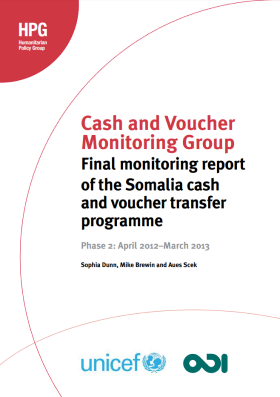
Final Monitoring Report of the Somalia Cash and Voucher Transfer Programme
Report
This report presents the findings of Phase 2 of a monitoring exercise of the Cash and Voucher Monitoring Group (CVMG), a unique partnership involving non-governmental organisations (NGOs) providing cash-based interventions in response to famine and humanitarian emergencies in South Central Somalia. It...
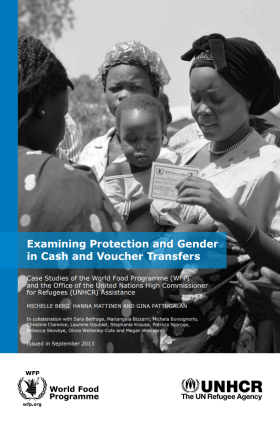
Examining Protection and Gender in Cash and Voucher Transfers – Report
Report
With cash and voucher transfers increasing as a form of humanitarian assistance, the World Food Programme (WFP) and the UN Refugee Agency (UNHCR) teamed up to study the potential protection and gender impact of such transfers. While much research had been done about economic and market impacts of cash and...

Transferencias de efectivo en contextos urbanos. Un manual para expertos
Guía y herramientas
Al observar el aumento de la población urbana en todo el mundo y su creciente vulnerabilidad ante catástrofes, el la CALP Network, con financiación de la European Commission for Humanitarian Office (ECHO), puso su empeño en investigar el estado actual y el efecto de los programas de respuesta...
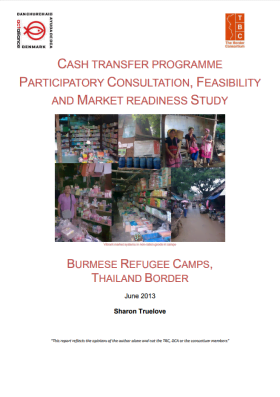
Cash Transfer Programme Participatory Consultation, Feasibility and Market Readiness Study: Burmese refugee camps, Thailand border
Report
This report is a participatory consultation, cash feasibility and market readiness study of the Burmese refugee camps on the Thailand border. It is a rapid, snap shot guide as to whether the conditions in two contrasting camps out of the full nine camps are conducive to a switch from the current ration...

Cash Emergency Preparedness (CEP) Assessment: Myanmar
Policy paper
Cash transfer programming (CTP) in emergencies is not new in Myanmar, with the first examples going back at least to Cyclone Nargis in 2009. CTP has also been used in humanitarian settings such as Kachin State. However, CTP is not yet being widely used for the current conflict context in Rakhine State due...

Livelihood Coping and Recovery from Disaster: The case of coastal Bangladesh
Report
Bangladesh has a long history of coping with and recovery from disasters. Although climate extremes are increasingly taking huge tolls especially in the southwestern part of the country, households are resisting the negative outcomes of these events eventually. This research explores the livelihood...


